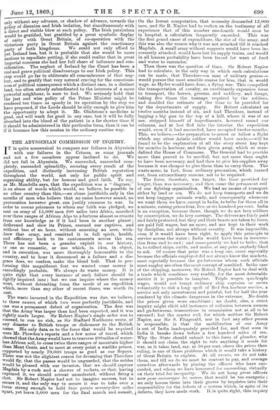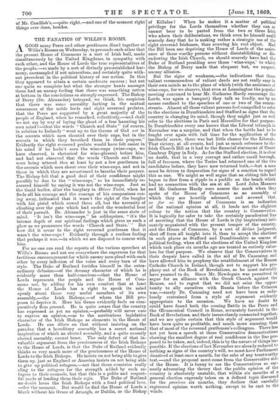THE ABYSSINIAN COMMISSION OF INQUIRY.
IT is quite nonsensical to compare our failures in Abyssinia with our failures in the Crimea, as some journals and not a few members appear inclined to do. We did not fail in Abyssinia. We succeeded, succeeded completely, succeeded splendidly, securing every result of the expedition, and distinctly increasing British reputation throughout the world, not only for public spirit and organizing ability, but for honour and good faith. To say, as Mr. Mundella says, that the expedition was a " disgrace," is an abuse of words which would, we believe, be possible in no other country than this,—an abuse justifiable only in the mouths of men who believe that no cause however sound, no provocation however great, can justify recourse to war. In order to rescue prisoners to whom our faith was pledged, we sent an army of 15,000 men 400 miles into Africa, marched over three ranges of African Alps to a fortress almost as remote from our knowledge as if it had been in another planet ; dethroned and slew its Prince, rescued our captives, and without loss of an hour, without annexing an acre, withdrew that army, and remitted it in full spirit, health, and efficiency back to its cantonments across the sea. There has not been a grander exploit in our history, or one so romantic, or one which, in idea, in object, and in execution, was more thoroughly honourable to the country, and to hear it denounced as a failure and a disgrace does, we confess, make the blood boil. That in performing this magnificent feat we wasted some money is exceedingly probable. We always do waste money. It is quite right that every instance of such failure should be rigidly inquired into ; but we can inquire where the money went, without detracting from the merit of an expedition which, more than any other of recent times, was worth its cost.
The waste incurred in the Expedition was due, we believe, to three causes, of which two were perfectly justifiable, and one was a permanent defect of organization. The first was that the Armylvas larger than had been expected, and it was rightly made larger. Sir Robert Napier's single order was to succeed, to run no risk, as Sir Stafford Northcote wrote, of any disaster to British troops or dishonour to the British name. His only data as to the force that would be required were Mr. Plowden's reports and a few notes of travel, which showed that the Army would have to traverse 400miles of waterless African soil, to cross twice three ranges of mountain higher than Mont Cenis, and to meet at every point a warlike prince, supported by nearly 70,000 troops as good as our Sepoys. There was not the slightest reason for dreaming that Theodore would fly, that the passes would be unguarded, that the nobles would be pleased with our invasion, that we should capture Magdala by a rush and a shower of rockets, or that, having captured it, we should retreat unmolested, without firing a shot. Sir Robert Napier had not to imagine success, but to secure it, and the only way to secure it was to take over a force• strong enough to hold four points seventy-five miles apart, yet leave 3,000 men for the final march and assault. On the lowest computation, that necessity demanded 12,000 men, and Sir R. Napier had to reckon on the testimony of all experience that of this number one-fourth would soon be in hospital, a calculation frequently exceeded. This was the first grand cause of expenditure, the size of the army, and this was also the reason why it was not attacked till it reached Magdala. A small army without supports would have been in cessantly attacked, would have lost its supply trains, and would in all human probability have been forced for want of food and water to surrender.
Then there was the question of time. Sir Robert Napier had to calculate, in the only way in which such calculations
can be made, that Theodore—a man of military genius— would pursue the most sensible course for him, that is, would wage, as Hyder would have done, a flying war. This compelled
the transportation of cavalry, an exorbitantly expensive force to transport, the horses, grooms, and saddlery, and forage, taking five times the tonnage required by the soldiers, and doubled the estimate of the time to be provided for by the departments of supply. Sir Robert calculated on twelve months instead of six, and had Theodore, instead of lugging a big gun to the top of a hill, where it was of no use, stripped himself of impedimenta, hovered round our columns, and at last fled into the interior, the expedition would, even if it had succeeded, have occupied twelve months.
This, we believe,—the preparation to arrest or follow a flight which any other Asiatic soldier would have made,—will be found to be the explanation of all the story about hay kept for months in harbour, and then given away, which so scandalized the House of Commons. The General had to provide more than proved to be needful, but not more than ought to have been necessary, and had then to give his supplies away because it was cheaper to give them than to carry them. The waste arose, in fact, from ordinary precaution, which turned out, from extraordinary reasons, not to be required.
The force, therefore, was larger, the time provided for longer, than was necessary, and then came the permanent evil of our fighting organization. We had no moans of transport either by land or sea. We do not keep transports and we do not keep baggage animals ready, and consequently whenever we want them we have, except in India, to bribe for them all in a minute, raising prices four, five, or six hundred per cent. India is an exception, because there, though we do not levy soldiers by conscription, we do levy carriage. The drivers are fairly paid and fairly protected, but they and their beasts are taken by force, are paid full wages, but no more, and are kept to their work by discipline, not always without severity. It was impossible, even if it would have been right, to apply this principle to service across the water ; India would have been in insurrec tion from end to end ; and consequently we had to bribe, that is, to collect ships, cattle, and mules, at any price anybody liked to ask. Of course that price was a long one, more especially because the officials employed did not always know the markets, most especially because the go-betweens whom such officials must employ are often the most corrupt of mankind. In the case of the shipping, moreover, Sir Robert Napier had to deal with a trade which combines very readily, for the most detestable service it is possible to imagine. Triple wages, quadruple wages, would not tempt ordinary ship captains or crews voluntarily to risk a long spell of Red Sea harbour service, a service not only monotonous and painful, but for half the year rendered by the climate dangerous in the extreme. No doubt the prices given were exorbitant ; no doubt, also, a strict inquiry might elicit odd instances of collusion between owners and go-betweens, transactions in commission not at all to be excused ; but the master evil, for which neither Sir Robert
Napier, nor Sir S. Fitzgerald, nor in fact any other person is responsible, is that the mobilization of our Army is out of India inadequately provided for, and that even in India it breaks down before a few hundred miles of sea. Why the State should submit to this form of plunder, why it should not claim the right to take anything it needs for war, as it takes land, say, at 50 per cent. above the prices then ruling, is one of those problems which it would take a history of Great Britain to explain. At all events, we do not take them, and till we do we must be content to pay, and revenge ourselves afterwards by placing the officers who have succeeded, and whom we have honoured for succeeding, virtually on their trial for incapacity. We do not hang great officers now pour encourager !ea autreg, that would be too energetic ; we only harass them into their graves by inquiries into their responsibility for the defects of a system which, in spite of its defects, they have made work. It is quite right, this inquiry of Mr. Candlish's,—quite right,—and one of the meanest right things ever done, besides.































 Previous page
Previous page